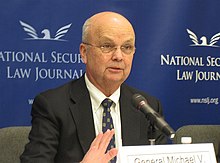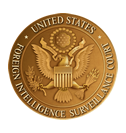
The United States Foreign Intelligence Surveillance Court (FISC), also called the FISA Court, is a U.S. federal court established under the Foreign Intelligence Surveillance Act of 1978 (FISA) to oversee requests for surveillance warrants against foreign spies inside the United States by federal law enforcement and intelligence agencies.

George Mason University (GMU) is a public research university in Fairfax County, Virginia, in Northern Virginia, near Washington, D.C. The university is named in honor of George Mason, a Founding Father of the United States.

The National Security Agency (NSA) is an intelligence agency of the United States Department of Defense, under the authority of the Director of National Intelligence (DNI). The NSA is responsible for global monitoring, collection, and processing of information and data for foreign intelligence and counterintelligence purposes, specializing in a discipline known as signals intelligence (SIGINT). The NSA is also tasked with the protection of U.S. communications networks and information systems. The NSA relies on a variety of measures to accomplish its mission, the majority of which are clandestine. The NSA has roughly 32,000 employees.
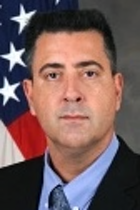
William C. Bradford is an American lawyer and scholar of political science. He previously served in United States Department of Energy as the Director, Office of Indian Energy until resigning on August 31, 2017 after derogatory and controversial comments he had posted on the Internet were publicized.

NSA warrantless surveillance — also commonly referred to as "warrantless-wiretapping" or "-wiretaps" — was the surveillance of persons within the United States, including U.S. citizens, during the collection of notionally foreign intelligence by the National Security Agency (NSA) as part of the Terrorist Surveillance Program. In late 2001, the NSA was authorized to monitor, without obtaining a FISA warrant, phone calls, Internet activities, text messages and other forms of communication involving any party believed by the NSA to be outside the U.S., even if the other end of the communication lays within the U.S.

The Terrorist Surveillance Program was an electronic surveillance program implemented by the National Security Agency (NSA) of the United States in the wake of the September 11, 2001 attacks. It was part of the President's Surveillance Program, which was in turn conducted under the overall umbrella of the War on Terrorism. The NSA, a signals intelligence agency, implemented the program to intercept al Qaeda communications overseas where at least one party is not a U.S. person. In 2005, The New York Times disclosed that technical glitches resulted in some of the intercepts including communications which were "purely domestic" in nature, igniting the NSA warrantless surveillance controversy. Later works, such as James Bamford's The Shadow Factory, described how the nature of the domestic surveillance was much, much more widespread than initially disclosed. In a 2011 New Yorker article, former NSA employee Bill Binney said that his colleagues told him that the NSA had begun storing billing and phone records from "everyone in the country."

The Five Eyes (FVEY) is an Anglosphere intelligence alliance comprising Australia, Canada, New Zealand, the United Kingdom, and the United States. These countries are parties to the multilateral UK-USA Agreement, a treaty for joint cooperation in signals intelligence. Informally, Five Eyes can refer to the group of intelligence agencies of these countries.
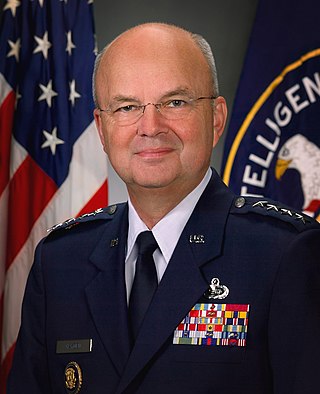
Michael Vincent Hayden is a retired United States Air Force four-star general and former Director of the National Security Agency, Principal Deputy Director of National Intelligence, and Director of the Central Intelligence Agency. He also serves as a professor at the George Mason University – Schar School of Policy and Government. Hayden currently co-chairs the Bipartisan Policy Center's Electric Grid Cyber Security Initiative.
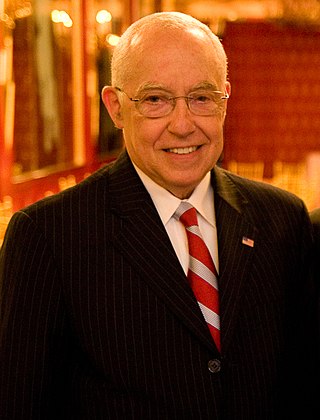
Michael Bernard Mukasey is an American lawyer and jurist who served as the 81st Attorney General of the United States from 2007 to 2009 and as a U.S. district judge of the U.S. District Court for the Southern District of New York from 1987 to 2006.

James Robert Clapper Jr. is a retired lieutenant general in the United States Air Force and former Director of National Intelligence. Clapper has held several key positions within the United States Intelligence Community. He served as director of the Defense Intelligence Agency (DIA) from 1992 until 1995. He was the first director of defense intelligence within the Office of the Director of National Intelligence and simultaneously the Under Secretary of Defense for Intelligence. He served as the director of the National Geospatial-Intelligence Agency (NGA) from September 2001 until June 2006.

Targeted killing is a form of assassination carried out by governments outside a judicial procedure or a battlefield.

PRISM is a code name for a program under which the United States National Security Agency (NSA) collects internet communications from various U.S. internet companies. The program is also known by the SIGAD US-984XN. PRISM collects stored internet communications based on demands made to internet companies such as Google LLC and Apple under Section 702 of the FISA Amendments Act of 2008 to turn over any data that match court-approved search terms. Among other things, the NSA can use these PRISM requests to target communications that were encrypted when they traveled across the internet backbone, to focus on stored data that telecommunication filtering systems discarded earlier, and to get data that is easier to handle.
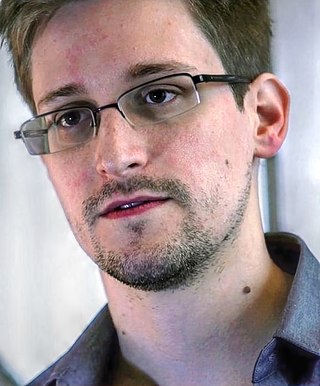
Edward Joseph Snowden is an American whistleblower who became a naturalized Russian citizen in 2022. In 2013, while working as a government contractor, Snowden leaked highly classified information from the National Security Agency (NSA). He is currently under indictment for espionage. His disclosures revealed numerous global surveillance programs, many run by the NSA and the Five Eyes intelligence alliance with the cooperation of telecommunication companies and European governments and prompted a cultural discussion about national security and individual privacy.

The practice of mass surveillance in the United States dates back to wartime monitoring and censorship of international communications from, to, or which passed through the United States. After the First and Second World Wars, mass surveillance continued throughout the Cold War period, via programs such as the Black Chamber and Project SHAMROCK. The formation and growth of federal law-enforcement and intelligence agencies such as the FBI, CIA, and NSA institutionalized surveillance used to also silence political dissent, as evidenced by COINTELPRO projects which targeted various organizations and individuals. During the Civil Rights Movement era, many individuals put under surveillance orders were first labelled as integrationists, then deemed subversive, and sometimes suspected to be supportive of the communist model of the United States' rival at the time, the Soviet Union. Other targeted individuals and groups included Native American activists, African American and Chicano liberation movement activists, and anti-war protesters.

During the 2010s, international media reports revealed new operational details about the Anglophone cryptographic agencies' global surveillance of both foreign and domestic nationals. The reports mostly relate to top secret documents leaked by ex-NSA contractor Edward Snowden. The documents consist of intelligence files relating to the U.S. and other Five Eyes countries. In June 2013, the first of Snowden's documents were published, with further selected documents released to various news outlets through the year.

American Civil Liberties Union v. Clapper, 785 F.3d 787, was a lawsuit by the American Civil Liberties Union (ACLU) and its affiliate, the New York Civil Liberties Union, against the United States federal government as represented by then-Director of National Intelligence James Clapper. The ACLU challenged the legality and constitutionality of the National Security Agency's (NSA) bulk phone metadata collection program.
The United States is widely considered to have one of the most extensive and sophisticated intelligence network of any nation in the world, with organizations including the Central Intelligence Agency and the National Security Agency, amongst others. It has conducted numerous espionage operations against foreign countries, including both allies and rivals. Its operations have included the use of industrial espionage, cyber espionage. and mass surveillance.
Rajesh "Raj" De is an American lawyer and former U.S. government official who later became the managing partner for the Washington, D.C., office of the law firm Mayer Brown. During the presidency of Barack Obama, he served in three significant government roles—as Principal Deputy Assistant Attorney General in the Office of Legal Policy, as White House Staff Secretary, and finally as general counsel of the U.S. National Security Agency.
Michael Ellis is an American attorney, Republican political operative, and former government official. He is a visiting fellow for law and technology with The Heritage Foundation's Meese Center for Legal and Judicial Studies. Ellis previously worked in multiple positions in the George W. Bush administration, for Republican congressman Devin Nunes and the Trump administration, being called a Donald Trump loyalist. He worked as a legal advisor to the National Security Council and was later appointed as Senior Director for Intelligence for the agency. In December 2021, he became the general counsel for the online video platform Rumble.
Robert L. Deitz is an American lawyer and former intelligence officer who served as senior counsel to the Director of the Central Intelligence Agency and General Counsel of the National Security Agency during the directorships of Michael Hayden. He is a professor of public policy at George Mason University's Schar School of Policy and Government.

